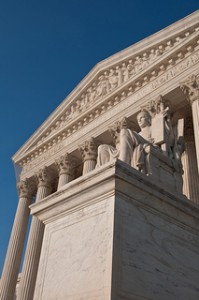 By Lisa Soronen [We are thrilled to have a guest post from Lisa Soronen, executive director of the State and Local Legal Center.]
By Lisa Soronen [We are thrilled to have a guest post from Lisa Soronen, executive director of the State and Local Legal Center.]
Last week, the Supreme Court struck down aggregate limits on individual contributions to candidates for federal office, political parties, and political action committees.
McCutcheon v. FEC will likely impact the dozen or so states that place aggregate limits on individual campaign contributions to candidates for state office. A cursory glance at state campaign finance laws regulating local elections indicates that states generally have not adopted aggregate caps meaning this decision will not affect contributions to local elections.
Federal law allows individuals to make “aggregate” contributions of $123,200 per two-year election cycle to candidates (up to $48,600) and non-candidate committees (up to $74,600). Shaun McCutcheon did not object to the $5,200 “base” contribution limits to federal candidates. Rather he wanted to contribute to more candidates but was prevented from doing so by the aggregate limit.
In a 5-4 opinion written by Justice Roberts, the Supreme Court rejected the FEC’s argument that the aggregate limits were permissible under the First Amendment because they prevent quid pro quo corruption. “If there is no corruption concern in giving nine candidates up to $5,200 each, it is difficult to understand how a tenth candidate can be regarded as corruptible if given $1,801, and all others corruptible if given a dime.”
As NCSL’s “State Limits on Contributions to Candidates” chart illustrates, about a dozen states provide aggregate limits on campaign contributions to state candidates. The constitutionality of these state laws seems doubtful in the wake of McCutcheon. As Andy Kroll points out in Mother Jones the impact of these state laws no longer applying will vary. In New York, for example, the aggregate limit to contribute to a state candidate is $150,000, so not much likely will change in that state.
Critics of the Court’s decision note that only the wealthy will benefit from it. Lawrence Hurley of Rutgers reports that according to the Center for Responsive Politics less than 600 donors nationwide gave the maximum allowable amounts to federal candidates in 2012.
Image courtesy of Flickr by Mark Fischer (creative-commons license, no changes made).
